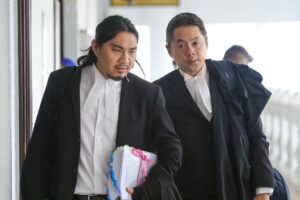By Leong Kar Yen | Malaysiakini
Seven students arrested for illegal assembly during an anti-ISA demonstration last year will challenge the constitutionality of their charge before the Kuala Lumpur High Court next month.
Their case was to continue yesterday before Kuala Lumpur Magistrate Lim Kui Lee but was postponed to July 9 after the students’ counsel — Edmund Bon, Latheefah Koya, Wan Razali Wan Kadir and Zulkepli Omar — obtained the date for a High Court hearing on June 14.
The application to hear the matter at the High Court is based on the defence counsel’s argument that the case would touch on provisions in the Federal Constitution.
Matters on the Federal Constitution can only be brought up at the higher courts.
On June 8, 2001, students Nik Noorhafizi, Nik Ibrahim, Zulkefle Idris, Ahmad Kamal Abdul Hamid, Rafzan Ramli, Wan Mohd Sanusi Wan Mohd Noor, Khirul Amal Mahmud and private sector worker Helman Sanuddin allegedly demonstrated outside the National Mosque in Kuala Lumpur.
The protest gathering was organised by the Abolish ISA Movement (GMI) following the arrests of several Keadilan and reformasi activists under the act for alleged involvement in a militant attempt to overthrow the government.
Relevance issue
Among the constitutional issues to be raised is whether the Federal Constitution and the Police Act are still relevant and needed to be used following Prime Minister Dr Mahathir Mohamad’s announcement on Sept 28 last year that the country was an “Islamic state” and should Islamic laws therefore be used.
“Alternatively if the Constitution is still relevant, should section 27 of the Police Act be declared as illegal because it goes against Article 3 and Article 10 as well as the al-Quran,” the defence team’s submission read.
Article 3 states that although Islam is the religion of the federation, citizens may practise individual religions while Article 10 affirms the freedom of assembly, expression, and speech and association.
The defence also argued that the written consent signed by Deputy Public Prosecutor Ahmad Bache to prosecute the seven was defective.
“The consent was signed by Ahmad and not the Public Prosecutor himself and this goes against the provisions under section 27C of the Police Act.
“With Ahmad signing the written consent, it forms the basis for a conflict of interest because he is also involved in the prosecution of the case,” the defence contended.
The defence also stated that sections within the Criminal Procedure Code which gives power to Deputy Public Prosecutors to have control over criminal procedures and prosecution, were unconstitutional.
“We submit that it is the definitive and incontrovertible principle that only the attorney-general has the exclusive power to initiate, carry out or stop any proceeding and this is based on Article 145(3) of the Federal Constitution and authorities …that have interpreted the provision as such,” the defence added.
The seven were charged in the Kuala Lumpur Magistrate Court on July 19 last year under section 27 of the Police Act but were later released on bail.
In 2013, two judges in the Court of Appeal declared that the Police Act 1967 was constitutional. A third judge dissented and held that the Act contravened Article 10 of the Federal Constitution. It was the first time a judge struck down the permit requirement for public assembly under the Act. Both the majority and minority judgments can be found here.


